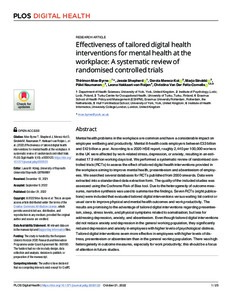Effectiveness of tailored digital health interventions for mental health at the workplace: A systematic review of randomised controlled trials
Moe-Byrne Thirimon; Shepherd Jessie; Merecz-Kot Dorota; Sinokki Marjo; Naumanen Päivi; Hakkaart-van Roijen Leona; Van Der Feltz-Cornelis Christina
https://urn.fi/URN:NBN:fi-fe2023020225529
Tiivistelmä
Mental health problems in the workplace are common and have a considerable impact on employee wellbeing and productivity. Mental ill-health costs employers between £33 billion and £42 billion a year. According to a 2020 HSE report, roughly 2,440 per 100,000 workers in the UK were affected by work-related stress, depression, or anxiety, resulting in an estimated 17.9 million working days lost. We performed a systematic review of randomised controlled trials (RCTs) to assess the effect of tailored digital health interventions provided in the workplace aiming to improve mental health, presenteeism and absenteeism of employees. We searched several databases for RCTs published from 2000 onwards. Data were extracted into a standardised data extraction form. The quality of the included studies was assessed using the Cochrane Risk of Bias tool. Due to the heterogeneity of outcome measures, narrative synthesis was used to summarise the findings. Seven RCTs (eight publications) were included that evaluated tailored digital interventions versus waiting list control or usual care to improve physical and mental health outcomes and work productivity. The results are promising to the advantage of tailored digital interventions regarding presenteeism, sleep, stress levels, and physical symptoms related to somatisation; but less for addressing depression, anxiety, and absenteeism. Even though tailored digital interventions did not reduce anxiety and depression in the general working population, they significantly reduced depression and anxiety in employees with higher levels of psychological distress. Tailored digital interventions seem more effective in employees with higher levels of distress, presenteeism or absenteeism than in the general working population. There was high heterogeneity in outcome measures, especially for work productivity; this should be a focus of attention in future studies.
Kokoelmat
- Rinnakkaistallenteet [27094]
